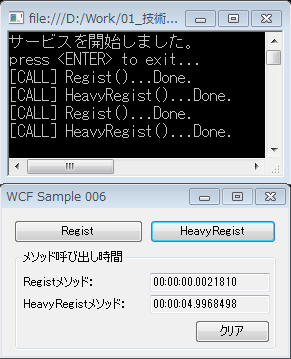WCFには、3種類の通信方法があります。
- 要求/応答パターン
- 一方向通信パターン
- 双方向通信パターン(非同期)
要求/応答パターンは、今までのサンプルで利用していた
ものです。メソッドを呼び出すとサービスからの結果が返ってくるまで
待ち状態になるものです。つまり普通のメソッド呼び出しと同じ。
一方向通信パターンは、サービスメソッドを呼び出した後、結果を待ちません。
処理の中には、サービスからの結果を必要としない場合もあり、その際に利用します。
一方向通信を有効にするには、OperationContractにIsOneWay属性をtrueで設定します。
デフォルトはfalseです。
前提条件として、IsOneWay=trueとしたメソッドは戻り値の型をvoidにする必要があります。
以下、サンプルです。
まずサービス定義.今回は、一方向通信を行うものと
通常のものの2つを定義します。
どちらのメソッドも、5秒待機した後処理を終了します。
using System; using System.Collections.Generic; using System.Linq; using System.ServiceModel; namespace Gsf.Samples.WCF { [ServiceContract(Namespace="http://Gsf.Samples.WCF")] public interface IMyService { // 一方向通信を行うにはIsOneWayをtrueに設定する. [OperationContract(IsOneWay=true)] void Regist(); [OperationContract] void HeavyRegist(); } }
using System; using System.Collections.Generic; using System.Linq; namespace Gsf.Samples.WCF { public class MyService : IMyService { public void Regist() { Console.Write("[CALL] Regist()..."); Wait(); Console.WriteLine("Done."); } public void HeavyRegist() { Console.Write("[CALL] HeavyRegist()..."); Wait(); Console.WriteLine("Done."); } static void Wait() { System.Threading.Thread.Sleep(TimeSpan.FromSeconds(5)); } } }
次にホストアプリ。
using System; using System.Collections.Generic; using System.Linq; using System.ServiceModel; namespace Gsf.Samples.WCF { class Program { static void Main(string[] args) { using (var host = new ServiceHost(typeof(MyService))) { host.Open(); Console.WriteLine("サービスを開始しました。"); Console.WriteLine("press <ENTER> to exit..."); Console.ReadLine(); host.Close(); } } } }
ホスト側のアプリケーション構成ファイル。
<?xml version="1.0" encoding="utf-8" ?> <configuration> <system.serviceModel> <services> <service name="Gsf.Samples.WCF.MyService"> <host> <baseAddresses> <add baseAddress="http://localhost:8086/WCFSample006/MyService"/> </baseAddresses> </host> <endpoint address="" binding="basicHttpBinding" contract="Gsf.Samples.WCF.IMyService" /> </service> </services> </system.serviceModel> </configuration>
次にクライアント側。
using System; using System.Collections.Generic; using System.Linq; using System.Windows.Forms; using System.Diagnostics; namespace Gsf.Samples.WCF { public partial class Form1 : Form { MyServiceRef.MyServiceClient _client; public Form1() { InitializeComponent(); } private void Form1_Load(object sender, EventArgs e) { _client = new MyServiceRef.MyServiceClient(); ActiveControl = btnCallRegistMethod; } private void Form1_FormClosing(object sender, FormClosingEventArgs e) { _client.Close(); } // 一方向通信のメソッドを呼び出し. private void btnCallRegistMethod_Click(object sender, EventArgs e) { Stopwatch watch = Stopwatch.StartNew(); _client.Regist(); watch.Stop(); txtRegistMethodResult.Text = watch.Elapsed.ToString(); } // 通常のメソッドを呼び出し. private void btnCallHeavyRegistMethod_Click(object sender, EventArgs e) { Stopwatch watch = Stopwatch.StartNew(); _client.HeavyRegist(); watch.Stop(); txtHeavyRegistMethodResult.Text = watch.Elapsed.ToString(); } private void btnClear_Click(object sender, EventArgs e) { txtRegistMethodResult.ResetText(); txtHeavyRegistMethodResult.ResetText(); } } }
最後にクライアント側のアプリケーション構成ファイル。
<?xml version="1.0" encoding="utf-8" ?> <configuration> <system.serviceModel> <client> <endpoint address="http://localhost:8086/WCFSample006/MyService" binding="basicHttpBinding" contract="MyServiceRef.IMyService" /> </client> </system.serviceModel> </configuration>
「Registメソッド」ボタンを押下すると、一方向通信処理の処理を
「HeavyRegistメソッド」ボタンを押下すると、通常の要求/応答の処理が
それぞれ走ります。どちらのメソッドも内部では同じSleep処理が走るのに
クライアント側の呼び出し時間が全然違う事が分かります。
サンプルは以下の場所にアップしてあります。
https://sites.google.com/site/gsfzero1/Home/WCF-Sample-006.zip
================================
過去の記事については、以下のページからご参照下さい。
- いろいろ備忘録日記まとめ
